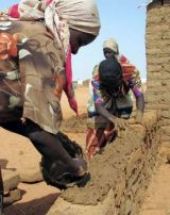Darfur talks need consensus on land rights and disarmament – mediators
Dec 6, 2005 (ABUJA) — Finding a consensus on land rights and disarmament is essential to advance peace talks between Sudan’s government and Darfur rebels, African mediators said, although both sides were far apart on the issues.
 The latest talks to end the violence in Darfur opened last week in Abuja with the rebels, presenting a unified front, forcing the government to tackle the key theme of power sharing for the first time after six previous negotiating rounds.
The latest talks to end the violence in Darfur opened last week in Abuja with the rebels, presenting a unified front, forcing the government to tackle the key theme of power sharing for the first time after six previous negotiating rounds.
Non-Arab rebels in the vast region of Darfur took up arms in early 2003 saying the central government marginalised the region and gave Arab tribes preferential treatment.
The government used proxy militias to quash the revolt. Tens of thousands of civilians have been killed and more than 2 million forced from their homes in violence Washington has called genocide.
Rebel leaders at the Abuja talks say the refugees must be allowed to go back to their homes so they can continue farming.
“Everyone must return to their homes first and then traditional solutions can be found for land rights,” said Abdel Wahed Mohamed el-Nur, one of the leaders of the main rebel group, the Sudan Liberation Army (SLA).
But the government refuses to even discuss the issue in the Nigerian capital, saying it should be left to a conference for all Darfur tribes after a peace deal is reached.
“Land is at the root of this whole conflict,” said Sam Ibok, one of the top African Union mediators at the Abuja peace negotiations. “There’s a very polarised approach to it.”
Conflict over land between sedentary farmers and mostly Arab nomadic cattle herders is at the heart of the Darfur violence, which was exacerbated by desertification and the rebel revolt.
Many of the hundreds of villages burnt and cleared of their populations during the almost three years of conflict in Darfur have been settled by Arab nomadic tribes which the United Nations says the government mobilised to fight the rebels.
“MAKE OR BREAK”
After almost a week of informal talks in Abjua, the government and rebels also held seemingly intractable positions over security arrangements for Darfur, which Ibok described as “make or break for the negotiations.
Making Darfur secure has been tough for the 6,000-strong African Union peacekeeping force deployed there.
U.N. Secretary-General Kofi Annan recently warned that the region was descending into anarchy, with widespread banditry, continued clashes between government and rebels and infighting between Arab militia.
A humanitarian cease-fire signed in April 2004 has been widely ignored. The AU has documented hundreds of violations and all parties have refused to disclose the positions of their forces as agreed.
The government wants the Arab militias, known locally as Janjaweed, to be disarmed simultaneously with the rebel groups.
“You cannot ask some tribes to disarm when the other still carries arms,” government spokesman Amin Hassan Omar said.
But rebels want the Janjaweed, who many say even the government can no longer control, to be disarmed first and then to be integrated into joint army units in Darfur.
(Reuters)
